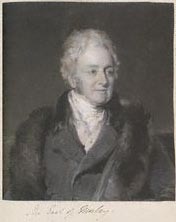
John Parker, 1st Earl of Morley
Encyclopedia

United Kingdom
The United Kingdom of Great Britain and Northern IrelandIn the United Kingdom and Dependencies, other languages have been officially recognised as legitimate autochthonous languages under the European Charter for Regional or Minority Languages...
peer and politician.
Morley was the only son of John Parker, 1st Baron Boringdon
John Parker, 1st Baron Boringdon
John Parker, 1st Baron Boringdon was a British peer and Member of Parliament.Parker was the son of John Parker and Catherine Poulett, daughter of John Poulett, 1st Earl Poulett, and was educated at Christ Church, Oxford. He was elected to the House of Commons for Bodmin in 1761, a seat he held...
, and his second wife the Hon. Theresa Robinson, daughter of Thomas Robinson, 1st Baron Grantham
Thomas Robinson, 1st Baron Grantham
Thomas Robinson, 1st Baron Grantham, KB, PC was a British diplomatist and politician. He was a younger son of Sir William Robinson, Bt...
. His mother died when he was three years old and his father when he was fifteen. He was educated at Christ Church, Oxford
Christ Church, Oxford
Christ Church or house of Christ, and thus sometimes known as The House), is one of the largest constituent colleges of the University of Oxford in England...
, and took his seat in the House of Lords
House of Lords
The House of Lords is the upper house of the Parliament of the United Kingdom. Like the House of Commons, it meets in the Palace of Westminster....
on his 21st birthday in 1793. Morley was an active member of the House of Lords, initially supporting government policies until the death of William Pitt the Younger
William Pitt the Younger
William Pitt the Younger was a British politician of the late 18th and early 19th centuries. He became the youngest Prime Minister in 1783 at the age of 24 . He left office in 1801, but was Prime Minister again from 1804 until his death in 1806...
in 1806. After Pitt's death he supported George Canning
George Canning
George Canning PC, FRS was a British statesman and politician who served as Foreign Secretary and briefly Prime Minister.-Early life: 1770–1793:...
, with whom he corresponded on political matters for many years. In 1815 he was created Viscount Boringdon, of North Molton in the County of Devon, and Earl of Morley, in the County of Devon. After Canning's death in 1827 he began to support the Whigs, and voted for the Great Reform Act of 1832. Apart from his involvement in national politics, Morley was also a great benefactor to public works in his home county of Devon
Devon
Devon is a large county in southwestern England. The county is sometimes referred to as Devonshire, although the term is rarely used inside the county itself as the county has never been officially "shired", it often indicates a traditional or historical context.The county shares borders with...
and was a Fellow of the Royal Society.
Lord Morley married, firstly, Lady Augusta Fane, second daughter of John Fane, 10th Earl of Westmorland
John Fane, 10th Earl of Westmorland
John Fane, 10th Earl of Westmorland KG, PC , styled Lord Burghersh between 1771 and 1774, was a British Tory politician of the late 18th and early 19th centuries, who served in most of the cabinets of the period, primarily as Lord Privy Seal.-Background:Westmorland was the son of John Fane, 9th...
, in 1804. They had one son, who died young, and were divorced in 1809. He married, secondly, Frances Talbot, daughter of Thomas Talbot, in 1809. They had one son and one daughter. Lord Morley died at his seat of Saltram House
Saltram House
Saltram House is a George II era mansion located in Plympton, Plymouth, England. The house that can be seen today is the work of Robert Adam, who altered the original Tudor house on two occasions. The saloon is sometimes cited as one of Adam's finest interiors...
in March 1840, aged 67, and was succeeded in his titles by his only son Edmund
Edmund Parker, 2nd Earl of Morley
Edmund Parker, 2nd Earl of Morley , known as Viscount Boringdon from 1815 to 1840, was a British peer and Whig politician....
. Lady Morley died in 1857.

